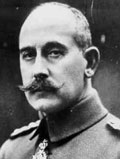The son of Ludwig Wilhelm August Prinz von Baden and grandson of the Grand Duke of Baden Karl Leopold I, Maximilian received a humanitarian education and became a military officer in the Prussian army. After the death of his uncle, Friedrich I (28 Sep 1907), Maximilian became heir presumptive to the throne of Grand Duchy occupied by his childless cousin Friedrich II, and also was made president of the First Chamber of the Baden parliament. He retired from the army in 1911. During World War I, Maximilian worked with the Red Cross and served as a honorary chairman of German-American association, which helped the prisoners of war. On 30 Sep 1918, Reich Chancellor Georg Graf von Hertling recommended Maximilian as his successor, and the Emperor Wilhelm II appointed him as Reich Chancellor and the President of the Prussian State Ministry on 3 Oct 1918. Maximilian von Baden signed the cease-fire memorandum and insisted on dismissal of Army Chief of Staff General Erich Ludendorff. As the last attempt to save the monarchy, Maximilian announced the abdication (9 Nov 1918) of Wilhelm both as Emperor and King of Prussia, though the Emperor did not authorize this proclamation. The same day, Maximilian transferred the office of Reich Chancellor to the leader of German Social Democrats, Friedrich Ebert, during their meeting in the residence of Reich Government. After his resignation, Maximilian devoted himself to educational activities. Biography source: [1] |

